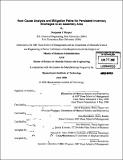Root cause analysis and mitigation paths for persistent inventory shortages to an assembly area
Author(s)
Harper, Benjamin C
DownloadFull printable version (18.83Mb)
Other Contributors
Leaders for Manufacturing Program.
Advisor
David Roylance and Sara Beckman.
Terms of use
Metadata
Show full item recordAbstract
The strategic alignment of a company impacts the culture of the organization, which in turn reinforces the strategic alignment. The corporate behavior resulting from the combination of alignment and culture determines the organization's ability to handle disruption and change. This thesis explores the intersection of these two elements in the context of experience gained at Spirit AeroSystems through an internship. The importance of alignment and culture of Spirit comes to light in observing the response of different parts of the organization to a supply shock caused by an industry wide titanium and aluminum shortage. A method to analytically assess delinquent part delivery and determine the optimal balance of increased upstream labor capacity versus downstream cost avoidance is presented. This information requires a supportive organizational structure to be utilized fully, and the form of this structure depends heavily on the existing culture to determine its viability. Several organizational structures are proposed to internalize the external costs of delinquency, and the cultural viability of these options is explored. The key attributes of this viable, effective structure are control by the Fuselage customer and cultural infusion and strategic coordination with Supply Chain Management.
Description
Thesis (M.B.A.)--Massachusetts Institute of Technology, Sloan School of Management; and, (S.M.)--Massachusetts Institute of Technology, Dept. of Materials Science and Engineering; in conjunction with the Leaders for Manufacturing Program at MIT, 2008. Includes bibliographical references (p. 89-90).
Date issued
2008Department
Leaders for Manufacturing Program at MIT; Massachusetts Institute of Technology. Department of Materials Science and Engineering; Sloan School of ManagementPublisher
Massachusetts Institute of Technology
Keywords
Sloan School of Management., Materials Science and Engineering., Leaders for Manufacturing Program.